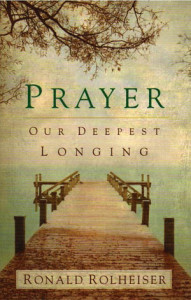In the Gospel of John we see Jesus as an adult and the first words out of Jesus his mouth are a question: “What are you looking for?” (John 1:38) Jesus offers an answer to this question at the end of the gospel on the morning of the resurrection to Mary Magdalene. Jesus asks Mary Magdalene the same question, “What are you looking for?” (John 20:15) Then - with deep affection - he answers the question, pronouncing her name: “Mary.”
Ultimately, this is what we are all looking for. We are looking for God to call our name, with affection.
Last week St. Monica featured a “Prayer Panel” with three people offering three approaches or insights into prayer (Ignatian, Augustinian and Merton). Much was said about defining prayer, what effective prayer is and what the various types of prayer are. St. John Damascene gave us one of the classic definitions of prayer, which is “The raising of our mind and heart to God.” The problem with many of us is that we tend to raise our minds but not our hearts. Our prayer tends to be intellectual but not affective - a way of gaining insight, rather than being touched in the heart.

Ultimately prayer is about love, not insight.
But just like any loving relationship, this cannot be rushed. Atheists tend to rush things. They say “I’ve seen enough. I have not gotten an answer. I will not follow God. I will no longer wait for God.” Faith goes in a different direction. Faith is patient. Faith says “I will wait for God.” Faith realizes that a loving relationship works with the natural flows of life itself. Things need time to unfold. They cannot be rushed, no matter how great our impatience or our discomfort.
This is why ritual is so important in prayer. Couples make it a habit to hold hands while walking or kiss each other before leaving the house. Over the long-term, this can seem somewhat mechanical, but it is through this ritual, this patient ritual, that the love begins to develop. It is a ritual that serves an important function. It speaks of fidelity and commitment beyond the ups and downs of fickle emotions.
Our society is addicted to experiences. Prayer cannot be an exciting, mystical high all of the time. This is where the importance of ritual plays a role. We allow the rites and rituals of our daily prayer, sometimes as boring as they are, to allow us to grow in the school of fidelity. It’s about showing up, irrespective of feelings and mood.
In the end it is then up to God to break through the restlessness and the boredom and begin to reveal himself to us. And when he does, God reveals himself to us not so much intellectually, but affectively - and lovingly calling us by name.
(Insights taken from the book, Prayer: Our Deepest Longing by Father Ronald Rolheiser)
